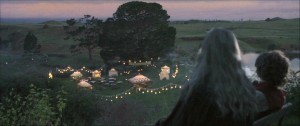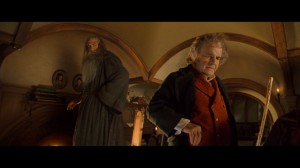Finally, the Ultimate Editions!
 The facts that are relevant to the Ultimate Editions are startling, especially considering that we’ve lived with them already for a decade without grasping their import.
The facts that are relevant to the Ultimate Editions are startling, especially considering that we’ve lived with them already for a decade without grasping their import.
Let’s start with Bilbo’s opening narration in “Concerning Hobbits.” What’s the date? His birthday, September 22nd. But the year is Shire Reckoning (S.R.) 1400, and the Long Expected Party happened in 1401. This has escaped almost everyone’s notice, and according to Google, the few folks who have spotted it think it’s either a trivial mistake or a conscious rounding-down. Both seem very unlikely to me. Aragorn tells Éowyn that he’s 87 years old as the Rohirrim ride to Helm’s Deep, and according to the book, he turned 88 the day before. It’s extremely unlikely that Aragorn would have noticed his birthday passing while helping Gandalf cure Théoden of Saruman’s possession spell, so “87” is the psychologically correct answer to Éowyn’s question. That’s attention to detail.
Nor has the year been reduced by one as a reflection of the timeline reduction we discussed in the previous installment. In the book, the Party is in S.R.1401 and the quest of Mt. Doom begins in 1418. In the movie, they’re a year apart. You’re either going to make that 1401 and 1402, or 1417 and 1418, which is to say you’re going to pick either the year of the Party or the Quest as your baseline and adjust the other date. Putting the Party in 1400 and the Quest in 1401 makes no sense.
If this really is 1400, that means it’s a year before the Long Expected Party. That’s right, Bilbo started his memoir on his 110th birthday in S.R. 1400, and that’s what will be revealed when the Ultimate Editions are assembled.
Does this make any sense? Oh, does it ever.
Bilbo is so overwhelmed by Party business that he has put up a sign forbidding admittance to Bag End for any other reason. Why, then, would he choose the morning of the Party to begin writing his memoir? The acceptable answer, the one that makes the original edition just credible enough to pass, is that he got everything taken care of by the evening of the 21st. On the day of the Party itself, he can now afford to relax, and spend some time on a long-delayed private pursuit. But of course this is completely out of character for Bilbo. He’s not that organized; it’s much easier to believe that he’d be busy right up until the party began. But if Bilbo began the memoir a year ago, there’s no such problem.
Frodo tells Gandalf that Bilbo has “lately … taken to locking himself in his study.” And we’ve established with the frame story that Bilbo wants to keep his memoir secret from Frodo at first, because it has some admissions he finds shameful. So Frodo’s report makes sense—but only if Bilbo has been writing the memoir for a while, not if he’d started it that morning. He wouldn’t be locking the study door if he were just sitting and contemplating writing his memoir.
Admittedly, that Frodo says “lately” implies that Bilbo has been secretive for less than a year, but I find it very credible that Frodo would have only noticed it within the last few months. When you’re being secretive, you’re careful at first about the secretiveness itself; not only do you lock the study door, you only work when no one’s around to notice that you’ve locked it. After a while, though, you become lax—and that’s why Frodo has only recently realized that Bilbo is “up to something” (which includes, of course, not just writing the memoir but also planning his departure — but the latter wouldn’t involve locking the study.)
 Most tellingly of all, Bilbo’s exasperated comment to Gandalf that he wants to find somewhere quiet where he can finish his book makes little sense if he in fact started it that morning. It’s not completely bizarre to complain about being unable to complete a huge project that you started just a few hours ago, but it makes much more sense if the project has been underway for a long while.
Most tellingly of all, Bilbo’s exasperated comment to Gandalf that he wants to find somewhere quiet where he can finish his book makes little sense if he in fact started it that morning. It’s not completely bizarre to complain about being unable to complete a huge project that you started just a few hours ago, but it makes much more sense if the project has been underway for a long while.
Furthermore, if Bilbo started writing that morning, he doesn’t yet know how much time he’ll be able to devote to the book, or how much everyday life at Bag End will be a distraction from it. In fact, it’s more likely that he’d be optimistic about working on the book now that the Party and its associated ruckus were behind him — it’s going to seem to him that he has some free time coming up. This complaint is much more rational if it’s coming from someone who has already determined that everyday life at Bag End and working on the book are incompatible.
The scenes between Gandalf and Bilbo have thus been cleverly written to make some barely acceptable sense in the existing edit, where Bilbo starts the memoir on the morning of the Party. But they will make much more sense in the Ultimate Edition, when Bilbo starts the memoir a full year before the conversation with Gandalf, and three movies earlier. And since it always seemed likely that The Hobbit would happen someday, this eventual alteration in meaning has been intended by Jackson from the beginning.
And if that seems unlikely, consider the opening tracking shot on the map of Middle-Earth, the one that ends by pulling back to reveal a cluttered room in Bag End and then moves through a doorway to show Bilbo at his writing desk. In the version we know from LOTR, the track begins over the Misty Mountains—as the location of Bilbo’s finding the Ring, the obvious place to start for this movie. But why is the camera already moving south when we crossfade to the map?
I believe the answer is that the sequence is actually longer, and was shot so that it could be used in the final version of any future Hobbit movie (after all, the shot more or less shows Bilbo’s journey in reverse). The full sequence, I would bet, begins with a shot of the representation of Erebor on the map, designed to crossfade from an actual shot of Erebor at the end of a historical prologue, just as the tracking shot on the map near the end of ROTK, showing the journey home, begins with a crossfade between Minas Tirith and its map representation. The shot would then track down to Lake-town, and through Mirkwood to the Misty Mountains — which is where we pick it up in the shorter LOTR version.


